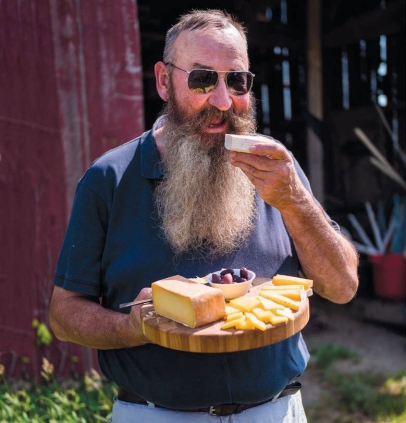A Future Built on Cheese
Connersville family takes legacy farm in sustainable new direction
Sitting close to the road about three miles south of Connersville is an unassuming barn-like yet modern structure where a delicious transformation happens. Here, a many-step process turns raw homestead milk into artisanal cheese, and multi-generational stewardship of a family farm continues.
Jacobs and Brichford Farmstead Cheese sits on the site of Matthew Brichford’s great-grandparents’ former farm. Another set of greatgrandparents resided nearby on land owned by the family since 1819.
Brichford acquired the property connecting the two tracts and since the early 1980s—along with his wife, Leslie Jacobs, and daughters Miah, Maize and Eliza—has sustained the tradition of making a living from the land.
IMPLEMENTING AN IDEA
The evolution into making small-batch, high-quality cheese was a natural extension of the family’s business and something they considered for several years. To prepare, they took classes, visited farmstead operations in France, researched breeds and spent hours consulting with experts before making the switch from being solely a livestock and dairy operation into creating French- and Italian-style cheeses.
Brichford has always been a trailblazer; the farm had the first New Zealand– style milking parlor in the state, and its livestock herds have used a rotational grazing system since the late 1980s and gone completely grain-free since the late 1990s. With Jacobs and Brichford cheeses, he says, eaters get the health benefits of the antioxidants the grass-fed animal has ingested. Rotational grazing offers a superior end product.
“In my opinion there is nothing better,” he says, whether it’s meat, milk or cheese. “You can definitely taste the difference,” he says Producing cheese is a labor-intensive endeavor. After the cheesemaking process is completed, the work is far from over. Depending on the variety, thousands of wheels must be turned over, or rinds washed at carefully documented intervals. Each cheese is assigned a number, data is diligently collected and tests are performed to ensure that there are no untoward pathogens present such as E. coli, staph, salmonella or listeria. The Brichfords took up the challenge without regrets.
AWARD-WINNING RESULTS
In 2012 they launched three cheeses: semi-soft earthy Ameribella, a Good Food Awards Winner in 2015; aged fontina-like Brianna; and creamy savory-sweet Everton, which won second in its class at the 2017 United States Cheese Championships.
Today their repertoire has expanded to include six additional varieties. Some are riffs on an original such as the sumptuous Brianna with Truffles and the aged Everton Premium Reserve. Others—such as Phetamias, a cow-milk feta that took 11th place in its class at the 2018 World Championship Cheese Contest in Wisconsin—have a distinct identity all their own. Rounding out the field is mild and smooth Adair, grassy and complex Tomme de Fayette and soft-ripened JQ.
The cheese makes its way to restaurants, grocery stores and specialty markets via distributors. It can be found far away at the Cowgirl Creamery counter in San Francisco’s Ferry Terminal Market and close to home as the savory finish to one of Kimbal Musk’s Hedge Row American Bistro small-plate offerings in Indianapolis.
Brad Gates, head chef of Hedge Row, explains how the cheese earned a place on their menu. “I discovered Jacobs and Brichford Farmstead Cheeses a few years back and used their Ameribella at my catering company. Before we opened Hedge Row, I worked with our sourcing director to find as many local purveyors as we could. I thought of Jacobs and Brichford and discovered their Phetamias cheese. I knew it would be a perfect complement to our Wood Roasted Viking Lamb Meatballs.”
IT TAKES A VILLAGE
After years of working physically demanding days, Brichford found himself facing a health crisis in late December 2016. He had severe bout with vascular disease that didn’t just slow him down but, he says, “completely flattened me.”
“Being a dairy farmer, I’m used to getting kicked in the teeth, but by the cows,” he says with a laugh.
Turning serious, he adds, “I’m an incredibly fortunate person and a very lucky guy. It was touch-and-go for a while, but I have a great doctor.” While Brichford spent three weeks in intensive care plus the next few months having surgeries and finding the right treatment path, his staff and family rallied to ensure the livestock farm and creamery continued to function. The farm crew oversaw the livestock herds and his daughter, Maize, continued in her role of courting distributors and conducting demonstrations at food shows.
“I was scheduled to make cheese the morning after I was hospitalized,” marvels Brichford. “The cheese crew stepped up and even though I wasn’t there they kept the plant running smoothly. I always had an appreciation for my life on the farm and for what I’m doing, but now I realize the importance of teaching others and giving them more responsibility. I still work long days but I recognize the need to transition some of the day-to-day responsibilities of this business.”
A SUSTAINABLE FUTURE
For Brichford, cheesemaking is a value-added business that will allow the family farm to continue into the future. It enables best practices such as feeding discarded whey to his hogs, following the seasonal rhythms of calving and using milk produced when vegetation is at its peak.
Brichford has no plans to retire; he is always experimenting and tweaking to improve the cheeses. He wishes that, “although what we produce is different than what most people grew up on, I hope they will branch out and try our cheeses.”
“Our greatest joys are hearing about someone new enjoying our cheese,” adds Jacobs, “and then spreading the word about the health benefits of raw milk cheeses and the importance of sustaining the land.”
Jacobs and Brichford Farmstead Cheese
2957 IN-1
Connersville
765.692.0056
JAndBCheese.com





